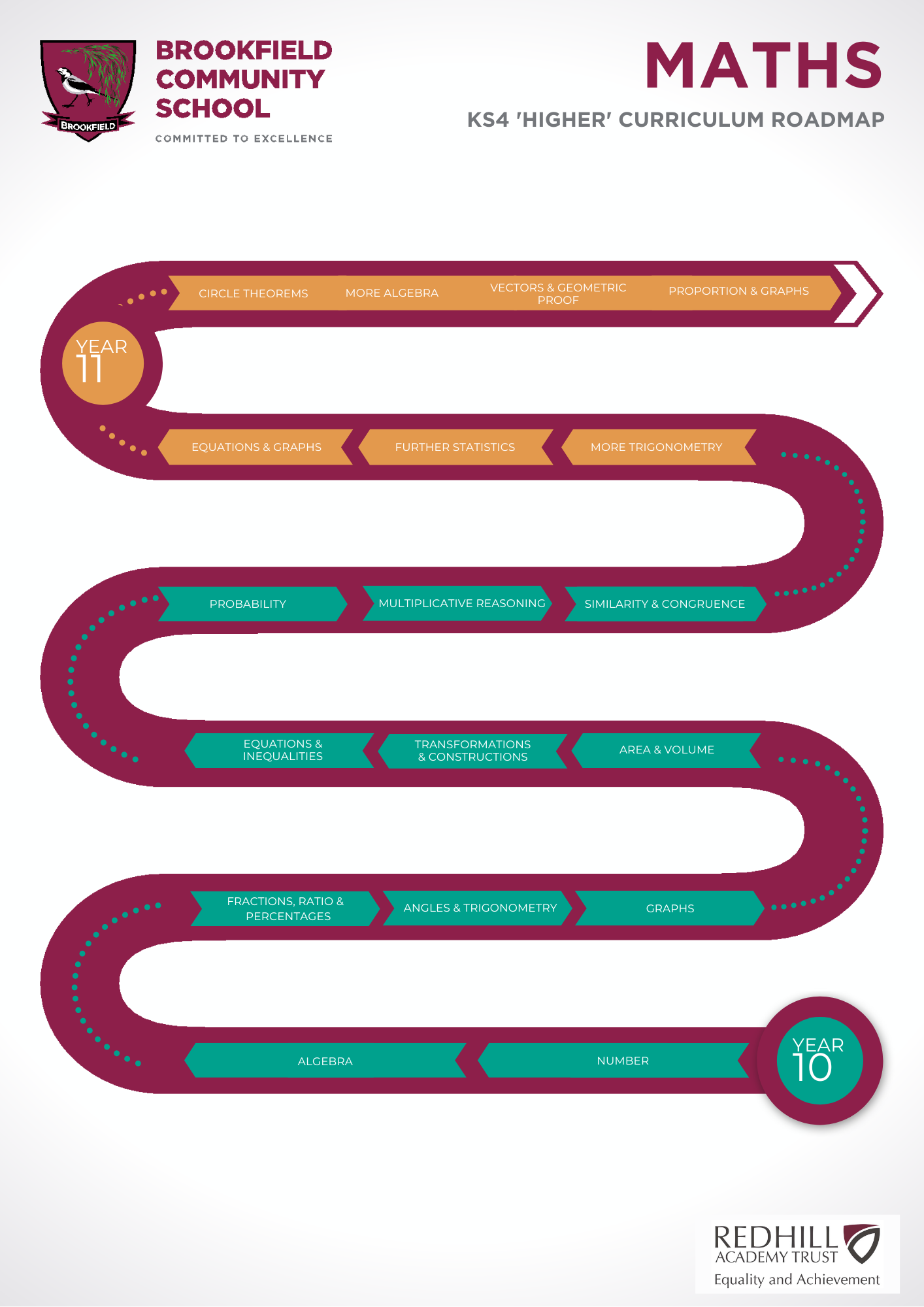Maths
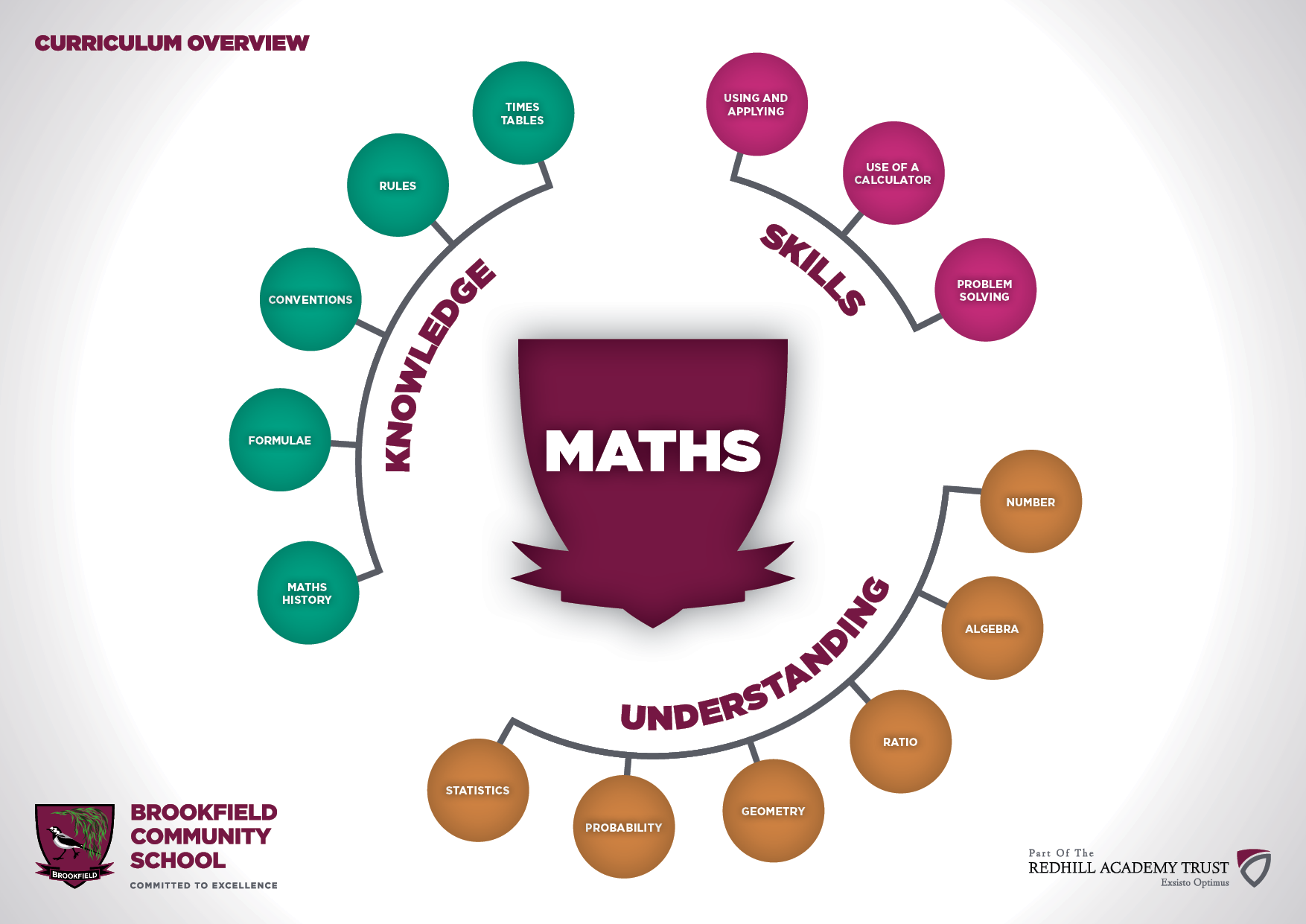 Click image to view full size.
Click image to view full size.
Introduction to Maths
Maths is at the core of all subjects, research, jobs and our understanding of the world around us. Without maths we cannot develop new medicines, technology, prevent global warming, examine sporting performance or put people into space. Maths is the language all of the world speaks, it breaks down barriers between different cultures and countries.
We believe that all students should have a deep understanding of maths; an understanding that maths is fun and that maths is vital.
We achieve this by:
Our content rich curriculum provides students with the powerful understanding required for them to thrive in their maths GCSE and A levels, as well as other subjects and also in their life beyond school. We follow the content of the national curriculum which we carefully sequence to enhance current foundations and developing mathematical reasoning whilst promoting logical thinking. Through discussion and practice, different approaches are explored and examined. Our curriculum gives our students the opportunity to gain a deep understanding of maths and elegant mathematical communication skills. In all we do, we promote independence, resilience and fluency of the subject and its skills.
Schemes of work are structured to build a logical picture of maths which complements current skills and advances them to deepen their understanding.
We also offer high quality support sessions after school in registration and at lunchtime that further develop students understanding, confidence and enjoyment of maths.
Key Stage 3
In KS3 students learn Maths for 4 hours each week, the students are taught in ability sets, these sets are fluid and students may change sets depending on their effort and performance in assessments.
Our mathematics curriculum is designed to progressively help students master a number of key skills throughout Key Stage 3. Lessons are planned and delivered to engage pupils in the curriculum and promote an enjoyment of the subject. The curriculum is structured to give students an in-depth understanding of their mathematical skills. It provides challenge throughout and promotes real life applications.
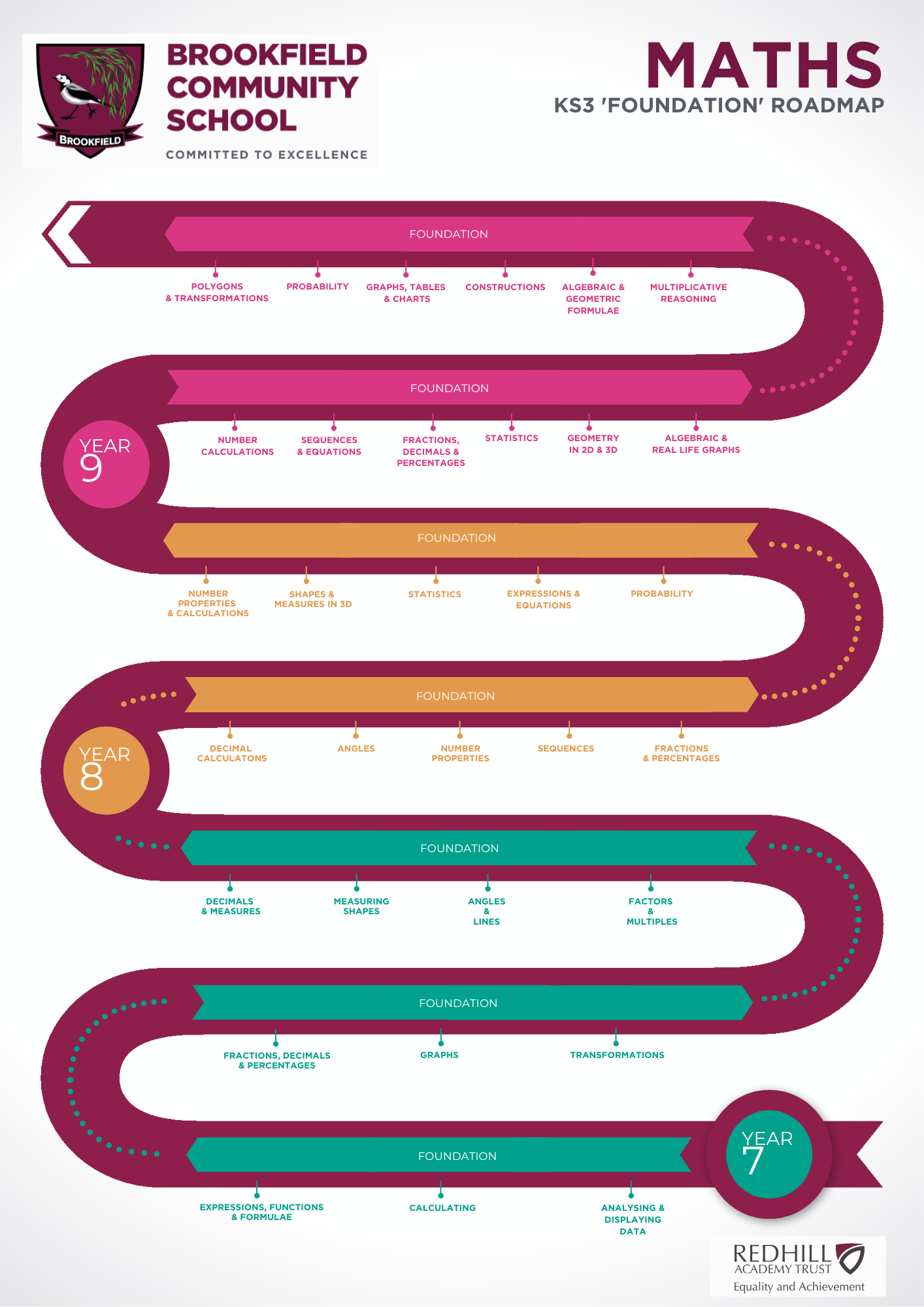
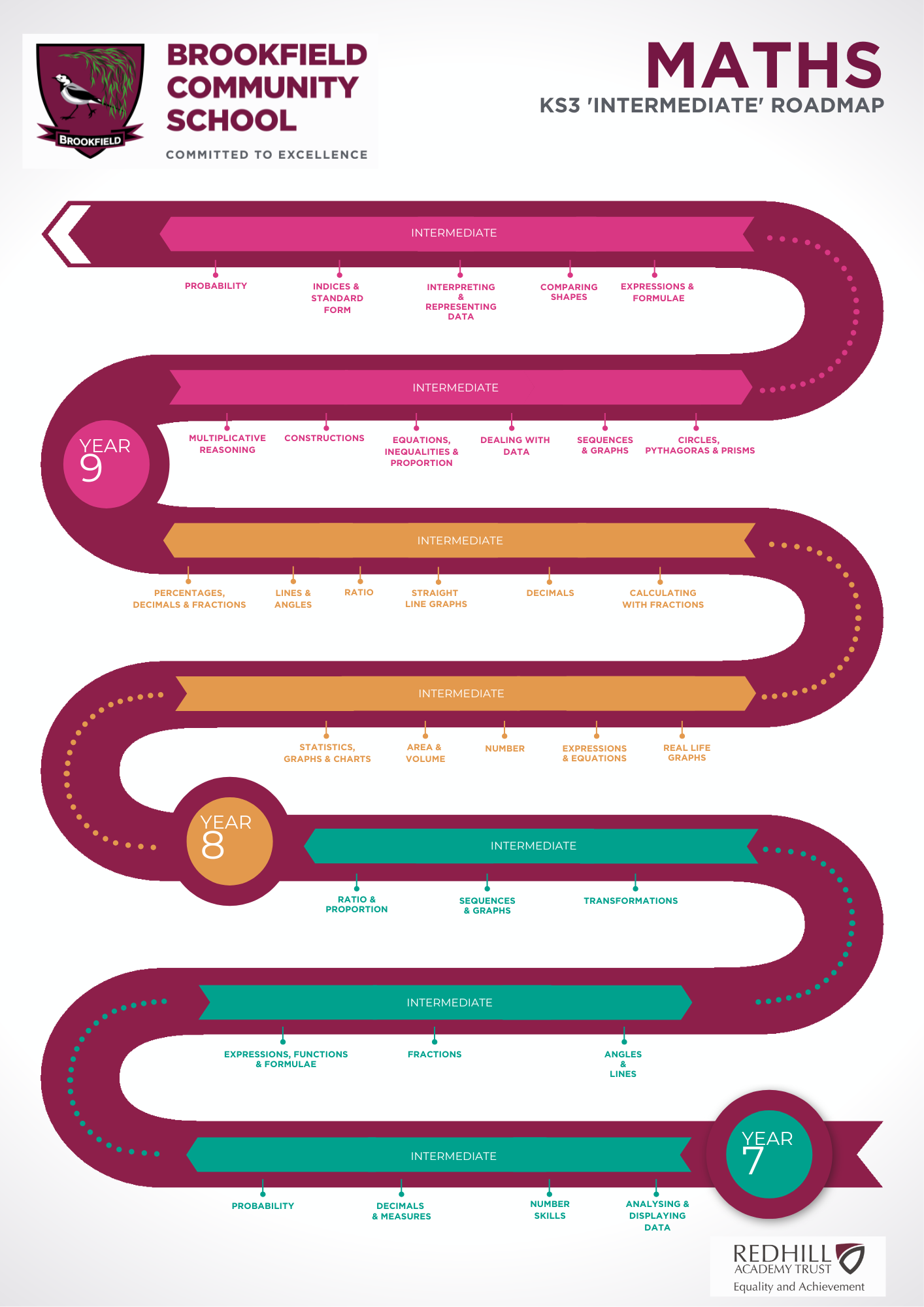
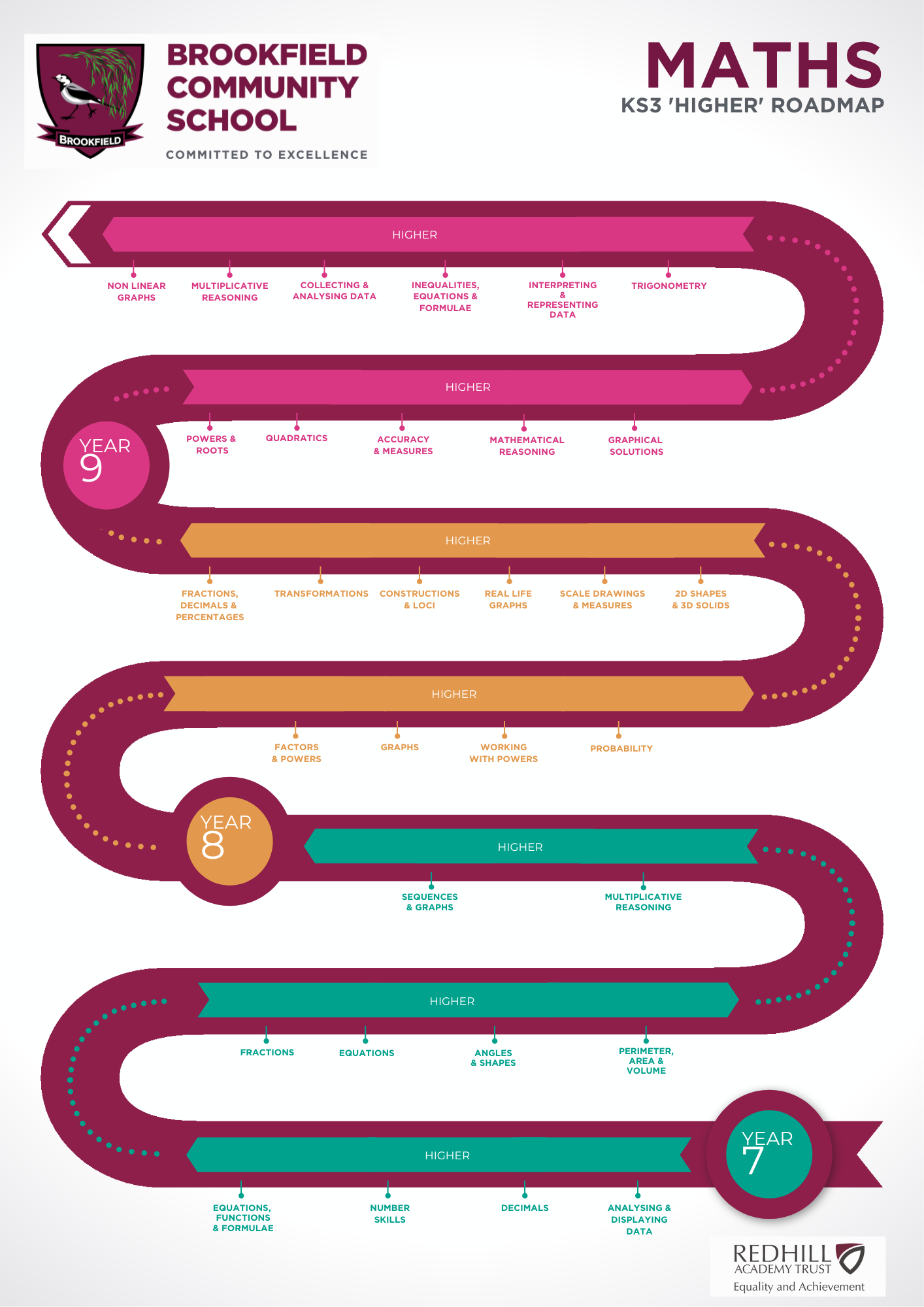
Key Stage 4
GCSE Mathematics
Exam Board: AQA
The Course
Maths is for everyone. It is diverse, engaging and essential in equipping students with the right skills to reach their future destination, whatever that may be.
Subject Content:
- Number
- Algebra
- Ratio, proportion and rates of change
- Geometry and measures
- Probability
- Statistics
How are students assessed?
Students are assessed by three exam papers of 1 hour and 30 minutes duration, and content from any part of the specification may be assessed in each paper. Each paper is worth 33.3% of the final mark.
- Paper 1: Non-Calculator
- Paper 2: Calculator
- Paper 3: Calculator
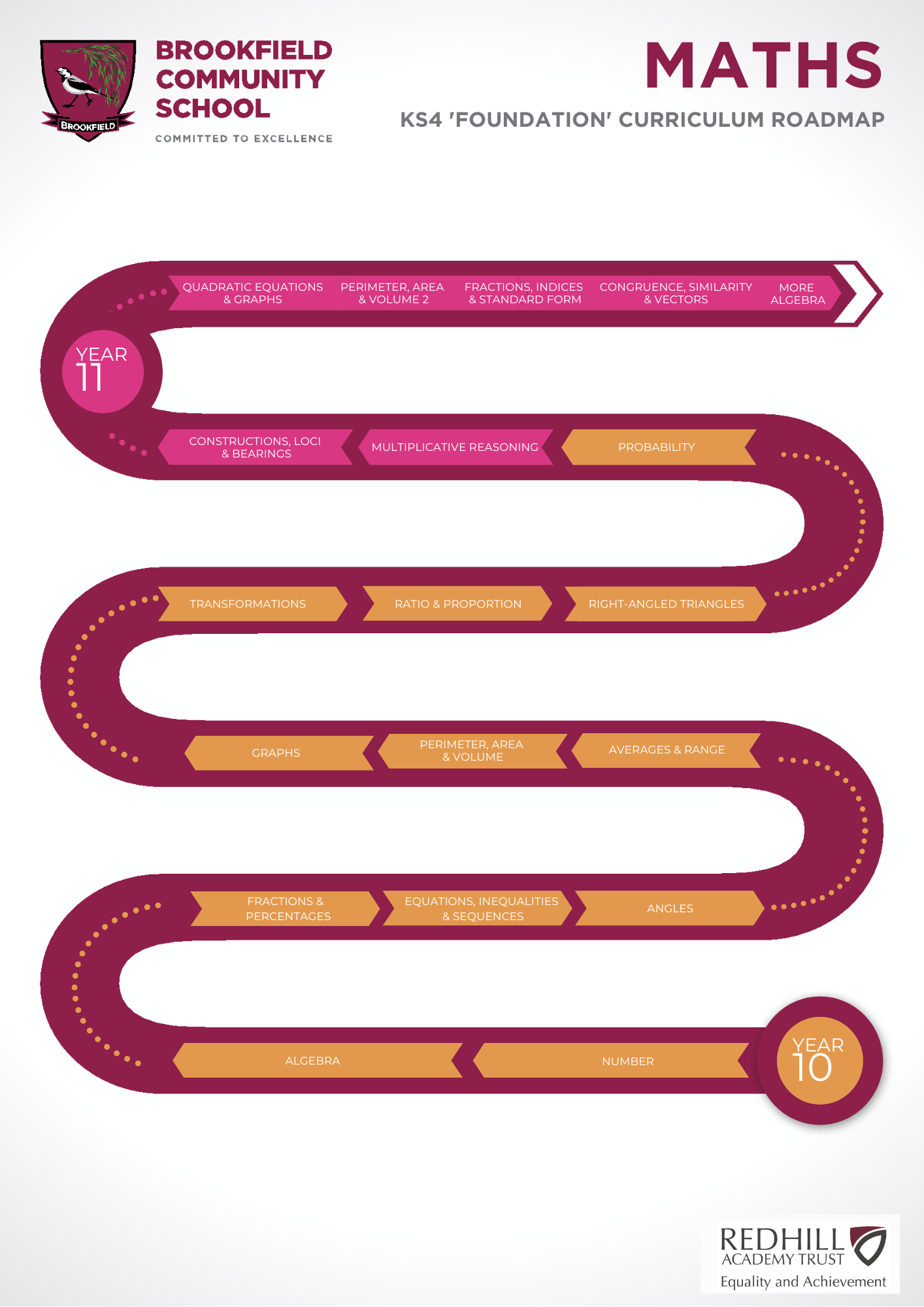
Level 2 Certificate in Further Mathematics
Exam Board: AQA
The Course
AQA Level 2 Certificate in Further Maths is a unique qualification designed to stretch and challenge high achieving mathematicians who either already have, or are expected to achieve the top grades in GCSE Mathematics or are likely to progress to study A Level Mathematics and possibly Further Mathematics.
High-achieving students are introduced to AS topics that will help them develop skills in algebra, geometry, calculus, matrices, trigonometry, functions and graphs. It is a hugely enjoyable course that our students love.
Subject Content:
- Number
- Algebra
- Coordinate Geometry (2 dimensions only)
- Calculus
- Matrix Transformations
- Geometry
How are students assessed?
Students are assessed through two written exams of 1 hour and 45 minutes duration. Each carries 80 marks and is worth 50% of the final grade. Content from any part of the specification may be assessed on either paper.
- Paper 1: Non-Calculator
- Paper 2: Calculator
Entry Level Certificate in Mathematics
Exam Board: AQA
The Course
The Entry Level Certificates is a nationally recognised qualification that gives students the opportunity to achieve a certificated award. Our ELC provides basic and relevant numeracy skills and ensures that every student can be a successful mathematician. The specification is co-teachable with our GCSE, to suit students who are studying both qualifications. Our ELC aims to build students’ confidence in maths, including those studying at the GCSE Foundation tier.
Subject Content:
- Component 1: properties of number
- Component 2: the four operations
- Component 3: ratio
- Component 4: money
- Component 5: the calendar and time
- Component 6: measures
- Component 7: geometry
- Component 8: statistics
How are students assessed?
A portfolio of work is produced, which includes eight components of work made up of between four and eight external assignments.
All components are internally assessed (teacher-marked) and then moderated by AQA. Each component is marked out of 30, giving a total mark out of 240 for the whole portfolio.
Key Stage 5
A Level Mathematics
Exam Board: AQA
The Course
Mathematics is a very useful tool that is utilised in a wide range of other subjects and future careers. It is also, however, a powerful and interesting subject in its own right that will challenge your thinking and develop your ability to problem-solve and deliver clear and rigorous mathematical arguments.
The aim of the A Level Mathematics course is to develop students’ mathematical and analytical abilities, both in terms of pure mathematics and applications of mathematics.
The course is designed to provide a progression from the work covered in GCSE higher tier.
The content of A Level Mathematics will include topics from Pure Mathematics, Statistics and Mechanics:
Pure Mathematics provides the algebraic skills and techniques you need in order to solve mathematical problems. The topics studied are:
- Proof
- Algebra and Functions
- Coordinate Geometry in the (x, y) plane
- Sequences and Series
- Trigonometry
- Exponentials and logarithms
- Differentiation
- Integration
- Numerical Methods
- Vectors
Statistics also models situations mathematically and is used to solve real life problems through numerical analysis and applications of probability theory. The topics studied are:
- Statistical sampling
- Data presentation and interpretation
- Probability
- Statistical Distributions
- Statistical hypothesis testing
Mechanics has some links with Physics and looks at physical world – how objects move and the forces that act upon them. Real life situations are modelled mathematically and problems are solved through application of the algebraic techniques from pure maths. The topics studied are:
- Quantities and units in Mechanics
- Kinematics
- Forces and Newton’s laws
- Moments
To be successful at Mathematics at this level you will need to be prepared to work very hard and get real enjoyment from exploring abstract mathematical concepts and the way they can be used in the exploration and explanation of the real world.
How are students assessed?
Students will be assessed on three, two hour papers at the end of Year 13. The use of calculators is permitted for all three papers. Paper 1 assesses only pure content. Paper 2 assesses pure and mechanics content. Paper 3 assesses pure and statistics content.
A Level Further Mathematics
Exam Board: AQA
The Course
Further Mathematics is taught in addition to, not in place of, A Level Mathematics. It is recommended for students who wish to progress to a degree in mathematics or a degree with a significant mathematical content.
Students will be taught to understand and use mathematical argument, language and proof as well as mathematical modelling and mathematical problem solving.
The pure content of A Level Further Mathematics will include:
- Proof
- Complex Numbers
- Matrices and Matrix Transformations
- Further Algebra and Functions
- Further Calculus
- Further Vectors
- Polar Coordinates
- Hyperbolic Functions
- Differential Equations
- Trigonometry
- Numerical Methods
Further to the pure content mentioned above students will also be taught two areas of applied Mathematics, Further Mechanics and Further Statistics.
Further Mechanics will build upon the content taught within the main A Level and will include:
- Momentum and collisions
- Work, energy and power
- Circular motion
- Centre of mass and moments
Further Statistics will build upon the content taught within the main A Level and will include:
- Discrete random variables
- Poisson distribution
- Continuous random variables
- Chi squared tests
- Confidence Intervals
How are students assessed?
Students will be assessed on three, two hour papers at the end of Year 13. The use of calculators is permitted for all three papers.
Papers 1 and 2 assess only pure content. Paper 3 assesses further mechanics and further statistics content.
Enrichment
At Brookfield, we provide the opportunity for students to become Maths Leaders. This is a great opportunity for any student in Y10 to Y13 to improve their leadership skills. Students that enjoy Maths help younger students with their Maths, help to run Maths club and support the Maths department on the Year 6’s induction days, at open evenings as well as judging the entries on our annual pie competition on Pi day.
Maths Club
We run a weekly maths club for students who enjoy Maths and want to do and learn more. During the club students engage in maths activities, games and even some mathematical magic!
Maths Drop-In
A support session for any student runs each week. Students are able to drop in with whatever maths questions they have, or to gain additional support with their homework.
Progression Opportunities
Maths is at the core of every career, though sometimes this isn’t always as obvious as you think, from the hairdresser who uses their estimation skills when cutting hair and best value knowledge when costing up their prices, to an elite coach that uses statistical analysis to get the best out of the sports people they are coaching.
Whatever career you choose Maths will be there, so it is important to get as many Maths skills built up in your time at school.
The website mathscareers.org.uk details the many and varied careers you can pursue with Maths.
A grade 9-7 in GCSE Maths will help you to go on to study A Level Maths and Further Maths, which opens up the opportunity to work in a career involving computer programming, engineering, physics and medicine.
Maths graduates have one of the highest rates of graduate employment. Mathematicians enter a very wide range of career areas ranging from aerospace and defence to finance. Studying maths provides you with valuable skills and a firm base for life-long learning.
Many past students have gone on to study mathematics or a mathematics related degree at highly prestigious universities with successful admissions to Oxbridge and other Russell Group universities.


